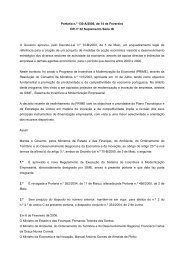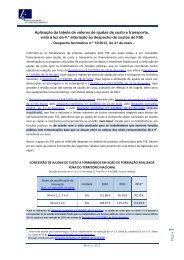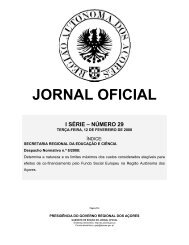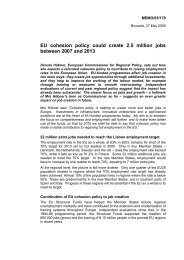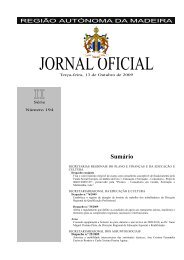Industrial Relations in Europe 2012 - European Commission - Europa
Industrial Relations in Europe 2012 - European Commission - Europa
Industrial Relations in Europe 2012 - European Commission - Europa
You also want an ePaper? Increase the reach of your titles
YUMPU automatically turns print PDFs into web optimized ePapers that Google loves.
4.3.3. Pay freezes<br />
A related method of adjustment has been the use of pay freezes. These measures have often<br />
operated alongside pay cuts and have frozen public sector pay or significant components of pay. In<br />
some countries this has been an important component of the government’s response such as <strong>in</strong><br />
Cyprus, Denmark, France, Italy, Poland and the UK, <strong>in</strong>dicat<strong>in</strong>g a less drastic response to the crisis.<br />
The first pay freezes were <strong>in</strong>troduced <strong>in</strong> 2008-9 and because of the severity of the crisis <strong>in</strong> Greece<br />
and Ireland agreed pay <strong>in</strong>creases were annulled. Pay freezes for two years have been common, but<br />
<strong>in</strong> the Czech Republic and Italy such measures are planned to cont<strong>in</strong>ue for four years until the end<br />
of 2014.<br />
Pay freezes take different forms and do not <strong>in</strong>variably result <strong>in</strong> pay reductions because other aspects<br />
of remuneration apart from base pay may <strong>in</strong>crease. France and the UK have implemented two year<br />
pay-scale freezes. In France, this has been set aga<strong>in</strong>st improvements <strong>in</strong> some other elements of pay,<br />
such as performance-related pay. In the UK, pay scale freezes have not stopped progression <strong>in</strong><br />
sectors such as the health service, enabl<strong>in</strong>g workers to cont<strong>in</strong>ue to ga<strong>in</strong> nom<strong>in</strong>al wage <strong>in</strong>creases by<br />
mov<strong>in</strong>g up the pay scale. The end of the UK pay freeze <strong>in</strong> 2013 will be marked by a slight eas<strong>in</strong>g of<br />
pay policy with the government anticipat<strong>in</strong>g that pay awards will average 1% <strong>in</strong> 2013-2014. Other<br />
methods <strong>in</strong> which wage freezes have been <strong>in</strong>troduced is by the suspension of collective barga<strong>in</strong><strong>in</strong>g<br />
as <strong>in</strong> Italy or by the failure to negotiate a collective agreement as occurred <strong>in</strong> the Netherlands <strong>in</strong><br />
central government after 2011.<br />
Another important variant on pay freezes relates to their coverage, with specific groups or sectors<br />
excluded. Although the structure and f<strong>in</strong>anc<strong>in</strong>g of public services varies between countries (see<br />
chapter 3 of this report), governments exercise the tightest control over central government and<br />
especially the civil service workforce. This stems from the tight alignment between the role of<br />
government as a policy maker and its role as an employer. Consequently the scope for the strongest<br />
control over public sector pay exists where the government is the direct employer, has political<br />
authority over policy decisions, and controls expenditure directly. The Netherlands illustrates this<br />
dynamic with a pay freeze from January 2011 implemented <strong>in</strong> central government, but <strong>in</strong> local<br />
government and hospitals wage agreements provided for 1.5% and 2% pay <strong>in</strong>creases respectively.<br />
In some countries specific groups have been excluded, notably teachers <strong>in</strong> Poland and Slovakia.<br />
Overall, the relative advantage of a pay freeze for government is that it is easy to understand,<br />
straightforward to implement and for politicians sends a signal to the electorate that public sector<br />
workers are not exempt from the type of wage adjustments that have occurred <strong>in</strong> the private sector<br />
dur<strong>in</strong>g the crisis.<br />
Although austerity is a phrase that has permeated discussion of the public sector across <strong>Europe</strong>,<br />
some countries have been less affected by the crisis and have not opted for pay freezes and wage<br />
reductions. These countries are exemplified by strong traditions of social dialogue and often a prior<br />
legacy of public sector modernisation. Austria, Germany and the Nordic countries illustrate these<br />
developments. In Austria, public employers were seek<strong>in</strong>g a pay freeze for 2010, but trade unions<br />
secured a wage <strong>in</strong>crease of around 1% and ga<strong>in</strong>ed higher <strong>in</strong>creases <strong>in</strong> 2011 (Glassner 2010) with<br />
pay claims of around 4% submitted for <strong>2012</strong>. There have also been pay rises <strong>in</strong> Denmark, F<strong>in</strong>land<br />
and Sweden with some variation between sub-sectors. Germany has also been shielded from pay<br />
cuts and ver.di, the trade union that barga<strong>in</strong>s on behalf of the public sector workforce, obta<strong>in</strong>ed a<br />
6.3% <strong>in</strong>crease over two years (<strong>2012</strong>-2014), <strong>in</strong>fluenc<strong>in</strong>g agreements <strong>in</strong> other parts of the economy.<br />
176





